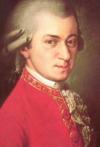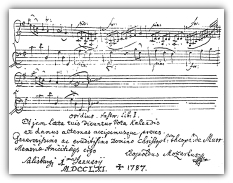|
 |
|
December 2005 |
2006: Mozart's 250th Birthday
|
Note: This Ezine was originally sent to our subscribers in 2
parts:
12/31/2005 | 1/8/2006
On this last night of 2005, I am thinking not only of what a wonderful year it
has been for Healing Music Enterprises, going full-time into the field of
music healing, finding a beautiful office in my own neighborhood, making two
new CD’s, and re-doing my website. I am also thinking of the upcoming 250th
birthday of Wolfgang Amadeus Mozart and all of the people that will hear of
him and his music for the first time. No doubt, the so-called “Mozart Effect”
will also be mentioned in different places and publications around the world.
 Just in
case people haven’t heard this, I want to make sure that you know before 2006
arrives, that listening to Mozart does NOT, repeat NOT raise your IQ. Not only
that, but the people who did the original research and wrote the book “The
Mozart Effect” never said that it did! It is frightening to me to think that
well-intentioned people could do such good work, publish this work in the
spirit of helping others, and then have their words twisted by marketers
wanting to make a quick buck. Just in
case people haven’t heard this, I want to make sure that you know before 2006
arrives, that listening to Mozart does NOT, repeat NOT raise your IQ. Not only
that, but the people who did the original research and wrote the book “The
Mozart Effect” never said that it did! It is frightening to me to think that
well-intentioned people could do such good work, publish this work in the
spirit of helping others, and then have their words twisted by marketers
wanting to make a quick buck.
In my own discipline of musicology, academic rigor is highly prized. As one
who came late to musicology (I was a performance major at the Bachelor’s and
Master’s levels) this academic rigor was not always easy for me. Therefore, I
am very sympathetic to musicians who are trying to make the world a better
place, through music, but do not realize how critical (and yes, jealous)
others can be. Perhaps because Don Campbell was a mentor of mine, I feel the
need to defend his book “The Mozart Effect” and put these facts out before the
naysayers emerge for the 250th birthday celebration.
The original research was done in the early 90’s at the University of
California, Irvine by a team of researchers working with pre-schoolers and
another group working with high school students who were about to take their
SAT exams. You can read all about it at
http://www.newscientist.com/article.ns?id=dn4918 . |
|
Anyway, I hope you’ll all take this opportunity to listen to something by
Mozart during January. I’d recommend the “Overture to the Marriage of Figaro”
or the “Piano Concerto in C Major, K. 467.” Mozart was an unbelievably
prolific composer, who was a genius in every genre he attempted. Mozart died
at age 35, a pauper. If you haven’t seen the movie “Amadeus” you might want to
check it out. It’s amazingly accurate and very entertaining.
You might also want to check out these previous issues of the ezine on Mozart:
http://www.healingmusicenterprises.com/ezine/2001-11.html
http://www.healingmusicenterprises.com/ezine/2003-05.html
OK friends, enjoy your evening and I sincerely hope your New Year gets off to
a healthy and harmonious beginning.
Please forward this to any friends or colleagues that you think would be
interested in subscribing to Healing Music Enterprises ezine.
Sincerely,
Alice
Return to Top
More on Mozart
(Originally mailed to subscribers on 1/8/2006)
Since I last sent out a letter on New Year's Eve, I've gotten many responses,
thanking me for
this information and asking other questions related to Mozart and improved
learning habits
or how any music affects one who is trying to study and learn new material.
One dear friend
sent this information:
 "I
feel that what Mozart's music does is to help clear out negative vibrations in
the environment of listeners. With those discordant vibes nullified for the
time being, the environmental vibes come back more into balance and harmony.
People's minds can work more effectively and efficiently." "I
feel that what Mozart's music does is to help clear out negative vibrations in
the environment of listeners. With those discordant vibes nullified for the
time being, the environmental vibes come back more into balance and harmony.
People's minds can work more effectively and efficiently."
"One of the worst things we can do after hearing a piece of music,
especially at concerts and other performances, is to cheer and clap! These
activities create the types of vibes that slice viciously throughout the
healing vibrations, utterly destroying them. I don't like to attend concerts
any more for this reason.
A far better behavior after a concert would be to just sit in one's seat,
close the eyes and allow the vibrations to continue their healings."
Now this friend is particularly tuned in to her inner, sacred spirit and is
able to feel music's healing vibrations in a uniquely spiritual manner. How
many of us can really sit still long enough to be that 'tuned in' to the
healing vibrations that have been set up around you, especially after a live
music performance. That is one of the many reasons I recommend live music
whenever
possible. There are a few rare hospitals and clinics around the world today
that actually allow properly garbed (i.e. sterile covering over clothes)
musicians, especially harpists, to play soft steady classical music in the
operating room, the palliative care area, perhaps the intensive care unit.
Most of us are so used to being bombarded with unwanted music that it becomes
difficult to enjoy the music that is out there for our pleasure. For me, the
best way to feel the power of music is either to play it for myself on the
piano, or to go to a live concert of some outstanding
musicians, like The Louisville Orchestra, the Juilliard Quartet, or a solo
musician like Lee Luvisi (my primary piano teacher) or Joshua Bell. I find
that truly outstanding singers can also transport me to a healing and serene
place.
So, it's not just Mozart, but Mozart certainly is one of the best. The proof
is in the listening to, becoming aware of and beginning the process of
healing, from stress, from anxiety, from depression, all kinds of illnesses.
Listen to a variety of music and please, let me know
what works for you!
Happy listening!
Alice H. Cash, Ph.D., LCSW
www.HealingMusicEnterprises.com
www.DrCashPrefers.com
Return to Top
|